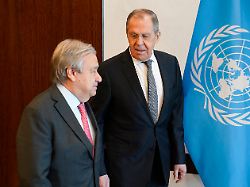Grain agreement termination
Will the UN make Moscow change its mind with a deal?
September 8, 2023, 11:47 p.m
Listen to article
This audio version was artificially generated. More Info | Send feedback
The UN wants to improve food security around the world – and has apparently approached Moscow to do so. In a letter that has now emerged, the Kremlin is offered an offer to find a way out of the dispute over the canceled grain agreement.
After Russia canceled the agreement to export Ukrainian grain, UN Secretary General António Guterres wants to save the deal with concessions to Moscow. In a letter obtained by the German Press Agency, Guterres suggested to Russian Foreign Minister Sergei Lavrov that Moscow could be reconnected to the international financial communications network Swift for certain payments by establishing a subsidiary through the sanctioned Russian agricultural bank. This means that the export of fertilizers and some agricultural products from Russia could be made possible again within 30 days. The “Bild” newspaper first reported on the letter.
In the letter, dated August 28, Guterres makes three other suggestions to enable these Russian exports. This involves insuring Russian ships during exports, thawing frozen assets of fertilizer companies in Europe and allowing Russian ships to enter European ports. The letter indirectly suggests that the United Nations is working with the EU for these concessions. The EU had already considered the possibility of allowing Russia to circumvent sanctions by establishing a subsidiary in the summer. The aim was to convince Russia to allow the export of Ukrainian grain across the Black Sea again.
The agreement, reached in the summer of 2022 and currently suspended by the Kremlin, was seen as a milestone in easing rising grain prices as millions of people face hunger. At the same time as the contract, a second agreement also decided on the export of fertilizer and food from Russia. From then on, Moscow complained that it was effectively unable to export anything because of the sanctions. According to the UN, fertilizer is also crucial to preventing a global hunger crisis. According to the information, fertilizer prices on the world market were at times 250 percent higher than before the war.
UN wants to improve food security
“The United Nations is not trying to reward Russia. We are trying to improve food security worldwide. Our goals are purely humanitarian in nature,” said UN circles. They emphasized that UN chief Guterres had always strongly condemned the Russian invasion of Ukraine. Moscow has often described the secretary general’s stance in the past as partisan and pro-Western.
The EU Commission did not want to comment on details of cooperation with the United Nations on Friday. However, a spokesman confirmed that the EU had expressed to Russia through the UN its openness to finding a more permanent, constructive solution through a designated subsidiary of the Russian Agricultural Bank, Swift payments in line with EU sanctions on agri-food transactions make possible.
In principle, the EU sanctions are not aimed at the transport of agricultural products between Russia and third countries. For example, there are exceptions to generally allow Russian ships to access EU ports if this is necessary for the purchase, import or transport of agricultural and food products. There has also been an exception since December 2022 that makes it possible to approve food and fertilizer transactions with sanctioned people.
All of this reflects the fact that it is not EU sanctions but Russia’s reckless policies that are endangering global food security. Another speaker also emphasized that work is continuing to develop alternative transport routes for grain from Ukraine. Russia’s goal is to replace Ukrainian products with Russian ones on the world market.
